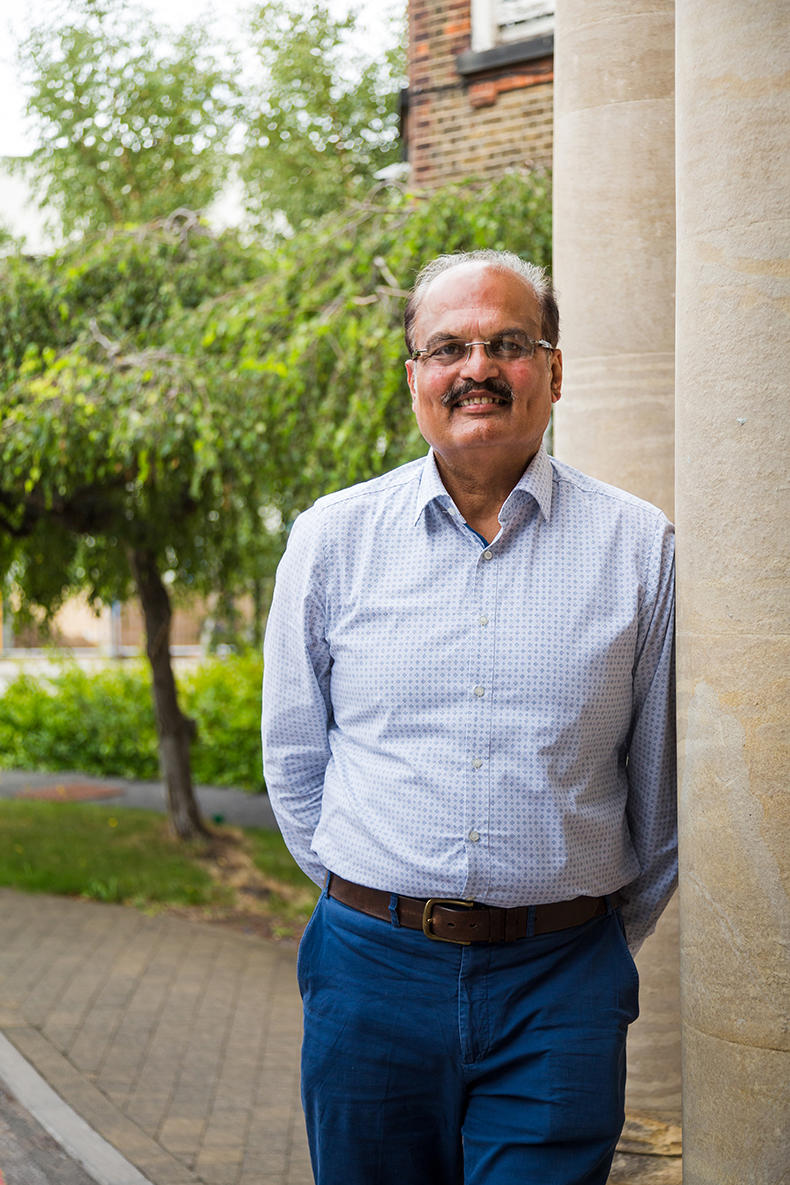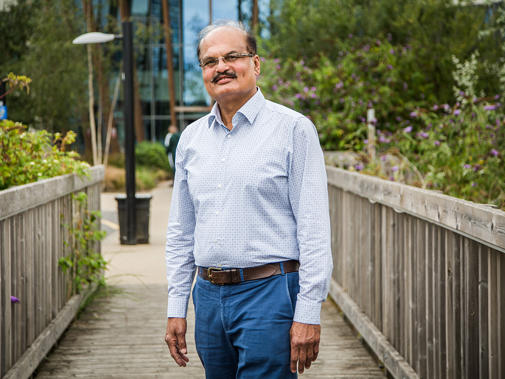For consultant paediatrician Arvind Shah, the desire to ‘give something back’ has always been at the centre of his personal and professional life.
Born and raised in India, where he completed his medical training, Dr Shah came to the UK almost 40 years ago and has since used all the time available to him to make a difference, not just to his patients, but to his colleagues at the North Middlesex hospital and to students all over the world.
Among the most notable achievements of his career is his work with the RCPCH (Royal College of Paediatrics and Child Health) for whom he has served as the principle regional examiner for South Asia. He was instrumental in launching seven RCPCH exam centres in India and has also extended access to the RCPCH exams to students in Myanmar and Nepal. He is now RCPCH regional advisory for South Asia.
Anybody that was ill would come to my Dad and he would take them to a doctorDr Shah
An associate professor at St George’s University in Grenada and an honorary senior lecturer at University College Hospital, Dr Shah has spent more than two decades teaching and working with medical students.
‘Whenever I go back to India or Myanmar or Nepal and I see the junior doctors there, it reminds me of myself,’ Dr Shah says.
‘I feel it is my duty to give them the knowledge I have so that they are equipped to work overseas and make their pathway for professional progression easier.’
All at sea
Facing challenging circumstances, particularly in early life, is not something unfamiliar to Dr Shah.
When he was just five years old his father, a successful merchant, took the decision to send him to live with his aunt in the city of Pune for the sake of his education, where he completed school and university and eventually qualified as a doctor.
‘My Dad was very caring and, at that time, was the only person in our village with a car,’ he says.
His father continued to inspire him and was still urging his son to study hard right up until his death.
‘He wanted me to be a doctor and I always respected that. Just two days before my final clinical examination for paediatrics he passed away,’ says Dr Shah.
‘I’d been to see him, and he asked why I’d come reminding me that my exams were the next day and that I had to go for it.’
Pocket money
 SHAH: 'It was the UK that I came to feel was my home'
SHAH: 'It was the UK that I came to feel was my home'
He completed his studies and was a gold medallist for his graduation year at Bombay (now Mumbai) University.
After several years practising in India, Dr Shah decided he wanted to develop his career through further training, and in 1983 came to the UK and began working at North Middlesex hospital.
Having never been to the UK before, he arrived with just £100 in his pocket and initially found lodgings at the Indian YMCA in London.
In addition to North Middlesex he has worked at Addenbrooke’s hospital in Cambridge and at Great Ormond Street where he was selected to go to Philadelphia, USA, as a research fellow.
Despite being offered the post of associate professor in USA, he decided he wanted to return to the UK.
‘I had read a lot about the country and came to the UK around the time that the film Gandhi was released and India had just won the cricket world cup,’ he jokes.
‘During my career I’ve worked in India, in the USA and in the UK, but it was the UK that I came to feel was my home.’
While the UK remains his home, Shah has never lost touch with his roots and has sought to use his experience to support international medical graduate doctors abroad and in the NHS, and serves as the treasurer of BAPIO (British Association of Physicians of Indian Origin).
Progress for minorities
While he is realistic about the challenges and inequalities BAME (black, Asian and minority ethnic) and overseas doctors in the NHS have and continue to face, he feels genuine dialogue and progress around these issues are now being made.
‘I believe in fairness and I believe in practising equality and diversity not just talking about it,’ he says.
‘I’m glad things are changing, there’s a lot more awareness about differential attainment, and training on equality and diversity. However, it’s important that we practise these things not just learn about them,’ he says.
I had read a lot about the country and came to the UK around the time that the film Gandhi was releasedDr Shah
Despite having affected every part of the world, COVID-19 is just the latest issue to expose many of the inequalities faced by BAME healthcare professionals and patients.
The pandemic has in just a few months utterly transformed day-to-day life and the landscape of the health service and how care in it is delivered.
Restrictions on global travel has seen Dr Shah’s work administering RCPCH exams suspended, although he is now working on conducting these remotely using an online platform.
Meanwhile Dr Shah’s workplace and ‘second home’, the North Middlesex hospital, has like so many parts of the NHS faced months of intense pressure.
‘At the height of the pandemic there was no time to think or to grieve, one of my nurse colleagues likened it to a war zone,’ he says.
‘As a paediatrician, I was not on the COVID front line, but I felt from the bottom of my heart that I wanted to do something for my hospital.’
To this end, Dr Shah organised a £9,000 donation through the Mukul Madhav Foundation to provide 50 meals a day for one month to frontline staff caring for patients with COVID-19.
He also took the incredibly generous step of choosing to donate an entire month’s worth of his salary specifically to support the hospital’s nursing team.
Stranded doctors
As treasurer of BAPIO he supported financial assistance to overseas doctors who had come to the UK to take the PLAB (professional and linguistic assessments board) examination and been left stranded following the lockdown on flights.
Dr Shah says the disproportionate numbers of deaths of BAME doctors and healthcare staff means it is essential the issues affecting BAME staff, such as access to effective risk assessments and support, are properly addressed in advance of a potential second wave of infections.
I believe in fairness and I believe in practising equality and diversityDr Shah
He also believes that, while the pandemic has ushered in some positive changes to working practices such as greater use of technology in areas such as remote consultations and tele-education, the pandemic has also exposed existing underinvestment in services for public healthcare.
‘I do feel COVID-19 has also created a perfect storm of public health inequalities.
‘Public health isn’t just about managing epidemics, it’s also about addressing issues like health inequalities, childhood death, obesity, smoking cessation and breast feeding, and COVID has highlighted that these are the core issues we need to be working on.’
Photos by Emma Brown

